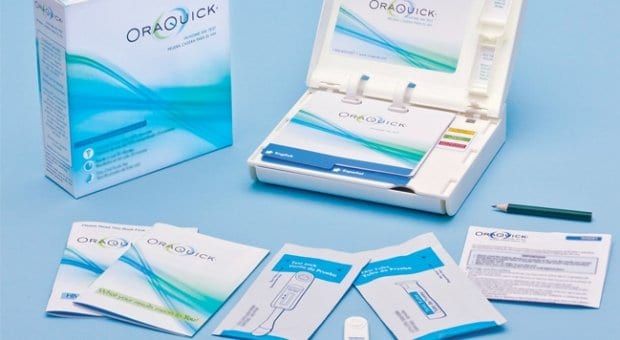Dear Dr Ren,
I’ve heard a lot of buzz lately about OraSure, an in-home test that can determine with a simple cheek swab whether someone is HIV-positive or negative. If this is real, it could mean that dating without condoms could be safe.
Still, as with so many new pharmaceuticals, there’s often important fine print. Can you tell us what’s going on with this product?
—Hopeful
****
Dear Hopeful,
OraSure, and its companion product OraQuick, are the first HIV tests ever to be made available directly to consumers for in-home use, an advancement that deserves applause in its own right. Imagine how many lives could have been saved were this technology available 30 years ago!
OraSure won FDA approval in June and hit the shelves by October. Also available online, it is universally accessible. This test is non-invasive, quick and private. You could theoretically test yourself and every date before you ever hear the sound of a zipper.
Too good to be true?
Well . . . yes.
While the product tests for both HIV-1 and -2, it measures only the body’s antibody load, often undetectable for months post-infection. So a negative test result could be misleading if you have contracted the virus but are not yet showing antibodies. In that case, the test has an eight-percent chance of recording a false negative.
You could use OraSure to test your date’s HIV status prior to having sex. Or you could choose only partners who advertise themselves as “D&D free and willing to prove it.” But a New York study examined how well it would work to ask potential partners to test themselves before sex. Most agreed, but one quarter refused, several became angry, and one even stormed out.
In addition to the possibility of a false negative and your date’s potential resistance to taking the test, there are a few other drawbacks as well.
The cost of each single-use kit is $40. Since you can hardly insist your date prove his status without swabbing your own cheek, the actual cost of each couple’s testing would be $80. You can buy a lot of condoms for $80!
We’ve long been accustomed to using condoms, and the wise have learned to eroticize them. But no one would dispute that barrier-free sex is preferable if it can be had risk-free. OraSure is counting on that perception.
Are there instances when using OraSure trumps the safety of condoms? Of course not. The purpose of the test is solely to give us knowledge about HIV status. When is that knowledge enough?
If you are in a committed relationship and would like to dispense with condoms with each other — a fluid-bonding contract — OraSure provides a personal and private way for you to do so. Two tests are necessary, separated in time by at least three months, but now you can take the tests at home.
If you are in a polyamorous relationship, this testing could be respectfully incorporated at routine intervals to ensure that everyone remains HIV free. Remember, OraSure tests only for HIV, though the company offers tests for HPV as well. You must remain vigilant about checking for other STIs.
What if you are living in an area where anonymous HIV testing is unavailable to you? That includes a lot of folks! If you have been sexually active but scrupulously safe in your behaviour, you could use OraSure with some confidence, as long as you have good reason to expect a favourable outcome. Any surprises and you are still in that unserviced area without follow-up support.
Think of a high-school student living in a remote location, totally closeted and devoid of access to confidential testing. While OraSure allows such students to get tested, which is a good thing, they will discover their results isolated and unprepared, not a good thing.
Although OraSure boasts 24/7/365 support, that support is limited to referring the caller to the nearest doctor or medical facility, not helpful in this situation.
The operators receive a paltry one-month’s training in product information and panic reduction. They are not health counsellors and are unprepared to manage the reactions of someone newly diagnosed with HIV. Expect lawsuits following tragedies.
It is primarily because of this lack of support and medical follow-up that Vancouver’s Health Initiative for Men (HIM) is not recommending OraSure.
Neither is YouthCo, whose staff are also concerned about the lack of any pre-test screening to educate the test-taker about HIV and the lack of tracking measures to follow up and manage the virus.
I am saddened that such tests are necessary at all. We have no need for secret tests for diabetes or hypertension. OraSure exists simply to manage the by-products of our collective sexual shame.
We continue to feel disgraced by a disease every bit as sympathetic as Alzheimer’s or MS because it carries with it an association with sexuality. That is what needs to change. Though I think it has some useful applications, overall OraSure misses the mark.

 Why you can trust Xtra
Why you can trust Xtra


